Fundraising and Events
Spring Fundraising: Our raffle and our Thai-Burmese benefit supper are on… and check out our tables of goods from Thailand at the University Singers spring concert on March 29th.
Annual Gourmet Thai-Burmese Benefit Supper
The Mae Sot Education Project invites you to attend its annual Gourmet Thai-Burmese Benefit Supper. With music, raffle draw & talks by volunteers.
Saturday, April 27th, 2019 6:30 p.m.
Oasis Christian Centre
219 Queen Street, Lennoxville
Tickets $60
Contact project committee members for tickets.
As life would have it, the cost of putting on our annual dinner has gone up. We are very grateful for your understanding and support. A tax receipt for a charitable donation will be given for $35. If you are unable to attend but would like to support our project, donations are always welcome!
Our 2019-20 Volunteer Team
“I believe this opportunity to go to Thailand with MSEP is truly a life changing experience that I am honoured to be part of. I’m extremely nervous to be away from my family for so long in a country that I’ve never been to, but I’m looking forward to all the connections I’ll make with the other volunteers, the students I’ll be working with and the members of the committee who will be helping us throughout this huge journey. I am really hoping that I get the chance to impact the lives of a few students in our partner schools in Mae Sot.” Mari Ann Burrows
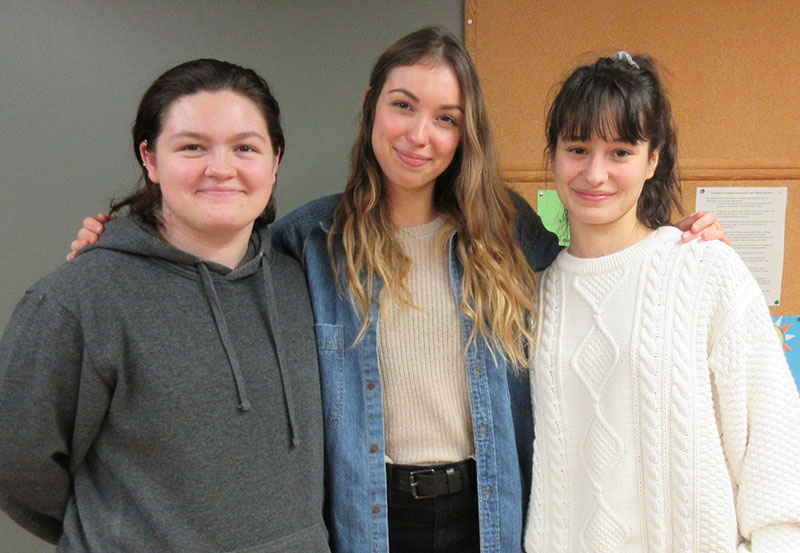
Our three new volunteers: Mari Ann Burrows, Virginie Lévesque, and Anne-Constance Blanchette
Educating for Justice:
MSEP Volunteers to speak at Champlain Symposium – April 2nd
Two former volunteers with MSEP will do a presentation on their experience with the project at Champlain’s annual international studies symposium, this year focusing on the theme Educating for Justice. Fidélie Camirand and Dania Paradis-Bouffard will share their observations regarding how MSEP’s work responds to this theme, and also answer questions about volunteering in Mae Sot at 2:00 pm in the Foyer of Centennial Theatre at Bishop’s. Their talk is one of several symposium events running throughout the day. Everyone is invited to attend.
Volunteer Experiences
Younger or older? It doesn’t matter.
By Fanny Barret, 2018 Volunteer (Writing in December 2018 from Mae Sot)
When I tell people that I am volunteering in a migrant school in Thailand, I usually get the same response: “Ohh, do you teach the really little ones? They must be so cute!”. Yes, the little ones are cute. In fact, they are adorable. With the MSEP, we don’t work with absolute beginners, but I do have grade 5 and 6 students, and some of them are quite young. After lunch, I always spend time playing with the nursery students. I leave my school, Hsa Mu Htaw, surrounded by 5 year-olds trying to high five me, climb on my bike and give me stickers and kisses. Their laughs carry me through the rest of the day, and it is impossible to leave Hsa Mu Htaw without a smile on my face. Because of this image, almost everyone I know wishes to work with young children if they are given the opportunity. I wasn’t any different when the project asked me where I would be most comfortable.
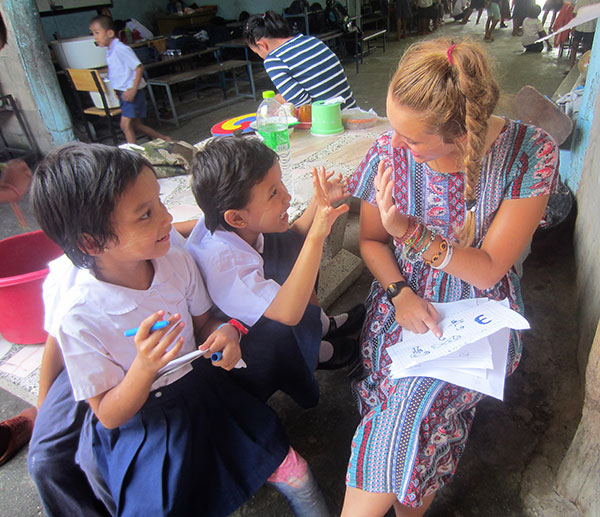
Fanny with younger students
Now, after six months, let me tell you how wrong I was. Of course, it is a pleasure and a challenge to teach at any level, but I was mistaken when I thought teaching lower grades would simply be better. After a few weeks, as I was listening to my roommate (who worked with 10, 11 and 12 students), I started being a little envious. She was doing so much with them, interacting so much. It was difficult, of course. There was a lot of planning to do, and she needed to be more prepared and confident. However, it seemed so interesting. I got confirmation of this when I was offered to take over a grade 12 class at Hsa Thoo Lei Learning Centre. After my first class, I had already connected with students in a way I hadn’t before. For the first time, my students actually understood the words I was saying. They could respond, give their opinions, we could joke together. Everything came naturally!
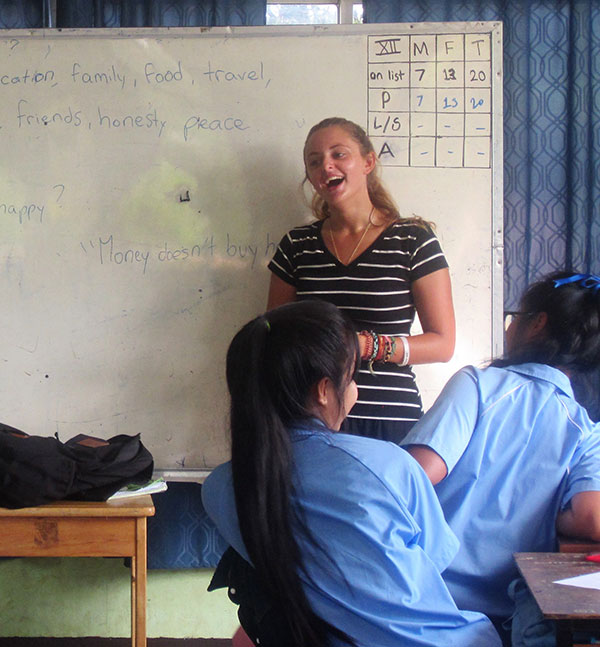
Fanny with older students
The bond I formed with my older students was very special. That being said, I don’t regret for a second having younger students, nor do I prefer older students. I love the joys and challenges that come with every day, with every class, regardless of the level of the students. No matter where you have the opportunity to volunteer teach, your experience will be unique, with its own challenges and beautiful surprises.
NOTE: Fanny chose to return to Mae Sot on her own in January to continue volunteering at Hsa Thoo Ley and Hsa Mu Htaw Learning Centres – where she is once again immersed in classrooms… with both older and younger students.
Some keys to successful volunteering
By Fidélie Camirand, 2018 Volunteer
The success of a volunteer is very hard to measure. It is a combination of so many factors and, hence, it cannot be calculated in terms of students’ results nor in hours spent on planning. I, myself, do not know to what extent I have been successful, but I do know that I learned a lot from my experience and that, looking back, I have some advice to give to future volunteers for their work to be as successful and enjoyable as possible.
Make long-term plans.
I can tell you, from experience, that planning day-by-day all the activities and grammar points you will teach the next morning is not very efficient. You will not be able to keep this rhythm for very long, and it will feel unstable and confusing for both for you and your students. Organizing larger plans that can last either a week or a month based on a theme or genre (such as poetry) or a goal (such as writing a story) makes lesson-planning more coherent and constructive. Making day-to-day plans is also necessary and will end up being very easy to do once you know where your group is heading longer term.
Set realistic goals for your classes.
Your students will, no doubt, be very bright young people, and you’ll want to get them involved in stimulating projects and activities. Six months might seem like a lot of time to do this, but it goes by very fast, and setting unrealistic expectations is disappointing for both your students and you. Long-term planning is helpful in preventing those situations, but consulting your students about what they want to do or think they can achieve in a certain period of time is also a good way to make sure to meet your common goals.
Accept that you will make mistakes.
Sometimes, the lesson you have planned won’t work at all. No matter how prepared you are, this moment will come. Instead of insisting on continuing an activity or project that is not well adapted to your group, it is better to admit your mistake. It is completely normal to make mistakes; your students make them too and will understand. However, you should always have a ‘plan B’ or a bank of ‘spare time activities’ to make sure you are not stuck in this uncomfortable situation too often or for too long.
Manage your fatigue well, take time for yourself and seek help when needed.
Teaching is a very demanding task and always being in contact with others can drain your energy. It is especially important not to neglect your health and to pay close attention to your energy level, to find a time each day to relax and be by yourself, to refill your batteries. If, in times of greater fatigue, you experience discouragement or homesickness, seek help. Your roommates, school community, family and friends and the project members back home will always be there to advise you or cheer you up. Most of all: Spend time in the school’s community! The moments I spent at school, cooking on a weekend or singing and dancing with my students are the ones I enjoyed the most. In these special times, I felt part of such a beautiful family that I never wanted to leave. Getting to know your students and colleagues outside of the classroom setting is the best way to create strong bonds and enhance your experience. Therefore, you should try to accept as many invitations as you can, either to houses, to church or temple or to events your students partake in. If you feel like you do not get a lot of these invitations, don’t hesitate to invite yourself by politely asking if you could stay over at the school, join a ceremony or a Sunday service. People might be shy, but they will always be very happy to see that you have a real interest in what they do.
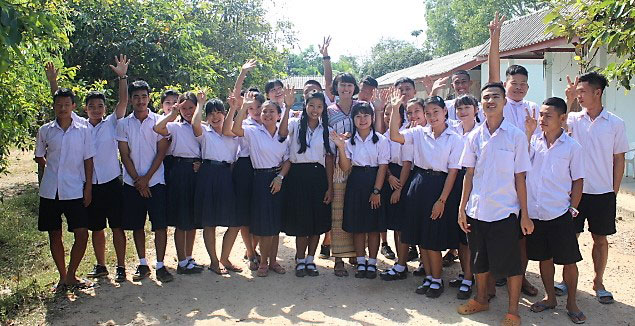
Fidelie with her students
To conclude, I could say that the keys to successful volunteering are to respect yourself at all times and to remember that the great experiences and everlasting memories you gain from the project will be proportionate to the investment you are willing to put into it.
MLCs – navigating obstacles, struggling to succeed
By Tyler Gordon, 2018 Volunteer
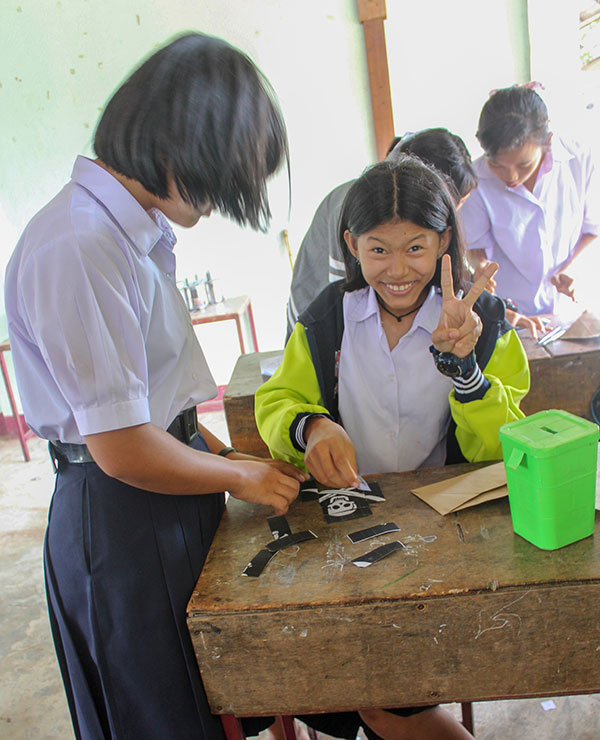 Every school takes actions to benefit the students, and sometimes educators must make hard decisions which may affect the students negatively. During my six months teaching in two migrant learning centers (MLC), I got a first-hand view of both the positive and negative aspects of school functioning.
Every school takes actions to benefit the students, and sometimes educators must make hard decisions which may affect the students negatively. During my six months teaching in two migrant learning centers (MLC), I got a first-hand view of both the positive and negative aspects of school functioning.
On the negative side school schedules often changed. Working for a school for the last five years, I have become accustomed to class schedules that are created and solidified a few months before the school year begins. In the MLCs, schedules could change in a matter of weeks. I experienced a number of schedule changes. The first change was made because the school administration wanted to put more focus on English language for the post-grade ten students as their next step would be the workforce or university. Thus they moved me from ninth grade to grades 11 and 12 because they felt a Burmese teacher would have an easier time teaching the grade nine Burmese curriculum, and I could be of more help with the older students. Although possibly confusing for both the students and me, this change made good sense.
The second schedule change I experienced was due to a lack of manpower. The MLC teachers, including myself, were there to teach core subjects such as Thai, Karen Studies, English, Math, Social Science, and Computer Science. When a teacher is absent or a volunteer leaves, teaching assignments must be reconfigured based on who is available to teach what. Thus upon my departure, the post-ten teachers were reconfiguring the schedule again as there was no replacement to take over the social science class I was leaving. I can only imagine how the students must have felt when they had to adjust to a new schedule only weeks after having settled into the latest changes. As a volunteer teacher, arriving one morning to hear that you have lost two classes because of a schedule change can be quite frustrating, not only because you have created a relationship with your students but because you have received no communication from the school administration (which is yet another problem!).
Now, for the good news. I was impressed by the number of workshops and trainings that the MLCs organize for the students. These trainings are given to every student from kindergarten to twelfth grade. They cover topics ranging from hygiene to child protection to consent. Some workshops, like child protection, are offered to both students and staff by local NGOs whereas other workshops are led by senior students. I remember arriving one morning to find my classroom empty. Upon inquiry, I discovered that my grade nines were teaching the grade four to eight students about hygiene and eye examinations. It was great that the MLC offered the senior students these leadership opportunities even if it did mean students would miss a regular class. On another occasion the school brought in an NGO to run a workshop on consent for the nursery, grade one and two students. Reflecting on these moments and realizing that in our North American schools it is hard enough to organize sex education, let alone a workshop on consent, in this area at least, I can say the MLCs may be ahead of our North American schools.
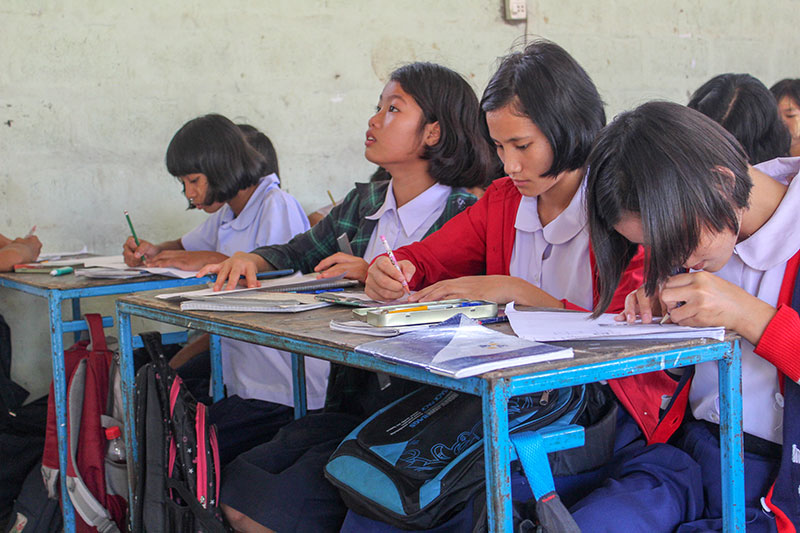
Tyler’s grade nine students
Living through the negative and positive aspects, I feel that the MLCs are providing students with brilliant trainings and workshops that will benefit them and their future. On the other hand, it is also clear that some students must live through learning challenges simply because there is a lack of manpower. The shifting schedules and resulting curriculum changes create a difficult learning environment. The migrant educators have their hands full and deserve to be applauded for their ways of creating learning opportunities and finding solutions to tough problems.
Thanking our donors for realisations and opportunities
By Poppy Webster, 2018 Volunteer
One day last fall, I was sitting in the sun surrounded by the nursery children at one of the learning centres where I was volunteering as we watched the older children play football. I had a little smile on my face as I realised how comfortable I felt to be there. The students made this so easy for me, as they are always so happy and full of joy. It was at this moment that I realised that joy doesn’t always come from material possessions or where we are but from our state of mind, from taking time to enjoy the smaller things in life and not taking them for granted. It’s the simple things that these children enjoy such as playing in the rain or having a teacher lift them so they can reach the monkey bars. The latest iPhone isn’t important to them; they’re just happy to be safe and to be able to play. Receiving an education is a bonus.
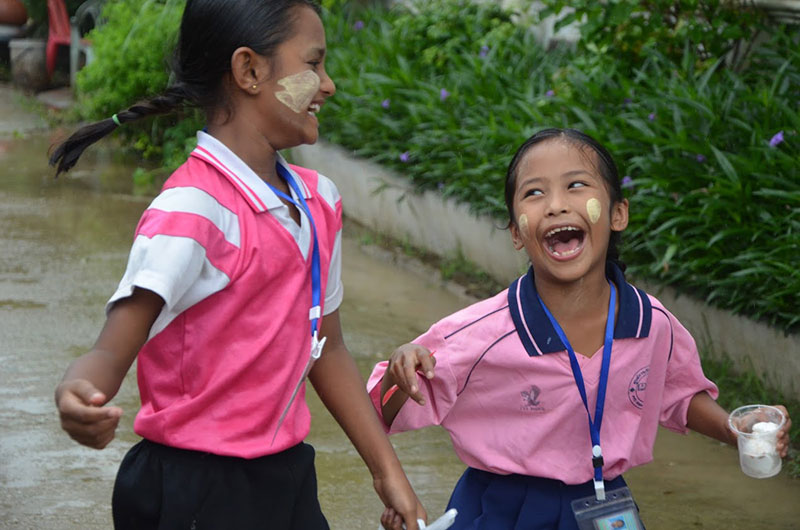
Poppy’s students
There were days when I did struggle with some aspects of their lives, including the fact that their basic human rights aren’t always respected. Schools sometimes lack clean drinking water, underwear, sanitary items and clothes for children, functioning toilets, teachers’ salaries along with many other basic necessities which we take for granted. This was difficult to comprehend, but I soon realised I could make a difference by making small changes.
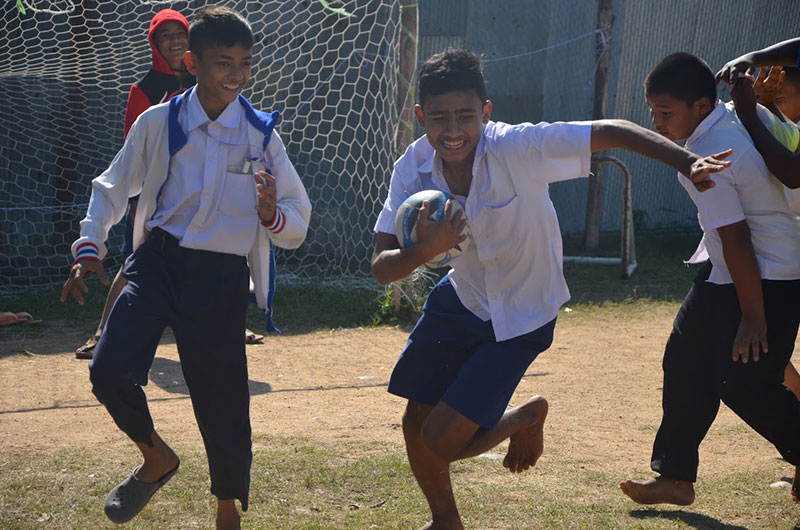
Poppy’s students at play
It is with thanks to your very kind generosity that I was able to witness first hand how small actions can have such a positive impact for these children and to make a difference. Thank you for your donations and for the support you have given me throughout my journey. You have really helped all of us keep these children safe and provide a space where they are able to access at least some basic necessities as well as to enjoy playing and learning, enabling them to continue their education. I have had the pleasure of seeing this with my own eyes. Now, months later, when I am sad or confused, I go to my ‘happy place’ remembering time spent with those children, enjoying life the way they do. Thank you!
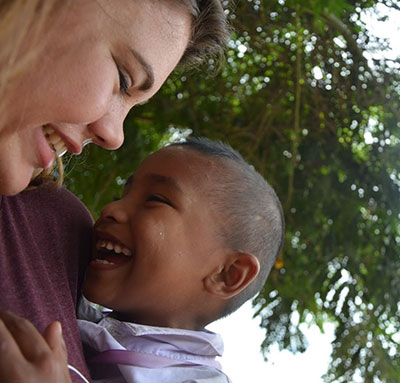
Migrant Education – A report from one of our partners
Pyo Khinn Update: A small school offers a new educational pathway for children
As we have been reporting during the last year, migrant learning centres in Mae Sot are increasingly creating pathways for children to access accredited education in both Thailand and Myanmar. Here is one interesting example: Our smallest school partner, Pyo Khinn Learning Centre, has begun a ‘Kor Sor Nor’ (KSN) or Thai nonformal education program. KSN is a “catch up” program developed for Thai children who have missed out on years of education. Taking three years of special classes, the kids (usually 10 – 14 years of age) are brought up to a level that allows them to transfer into the Royal Thai Government (RTG) schools, or alternatively, to pursue vocational education. The program is now open to Burmese migrant youth as well, and KSN programs can even be offered in migrant learning centres.
So this last year, 11 children at Pyo Khinn Learning Centre have taken special KSN classes four mornings a week, while also following the ordinary Myanmar curriculum the rest of the time. The kids must be truly motivated! If they pass the first year KSN tests in March, they will then go on to year two of the program. Meanwhile, a second cohort possibly 15 children is expected to begin the program in June. Working on Thai language skills is a big part of the KSN curriculum, of course, but children also learn other skills and undertake ‘hands-on’ learning activities that prepare them to pursue Thai education in official RTG schools.
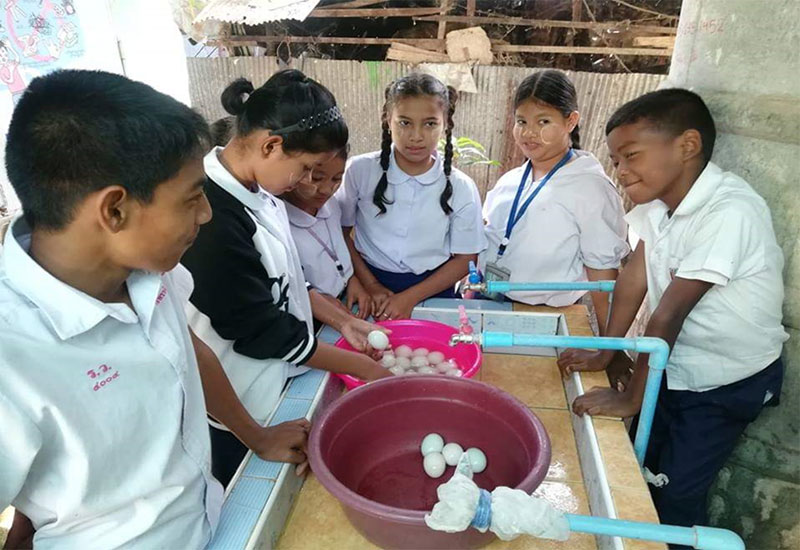
Pyo Khinn KSN students at work
Worth noting is the fact that the Thai government does not pay for KSN at the migrant learning centres, and offering it involves additional expense and fundraising. The school must pay for a Thai teacher, for learning materials and outings that are beyond its capacity and for which it has had to seek additional funding from NGOs and donors. Needless to say, going forward, funding will continue to be a big challenge in sustaining this undertaking. As a Muslim school serving a very poor Muslim migrant community in Mae Sot, Pyo Khinn is offering an invaluable service that could open the doors to more durable solutions for children and families who do not see a future in Myanmar, given its increasingly anti-Muslim cultural environment. While not a pathway to Thai citizenship, the KSN program does offer children hope for accredited education and through it, for personal and even career development. This small school’s initiative is just one example of the important role that migrant learning centres can play.
NOTE: Two of our other partners, BSHOH and Parami Learning Centres, both larger schools with more learning options (both vocational and academic) for students, have also hosted Kor Sor Nor programs in recent years for youth who see their future in Thailand.
A new article about developments in migrant education on the border written by two members of our team, Mary Purkey and Megan Irving, will appear in the upcoming issue of Oxford University’s Forced Migration Review focusing on ‘Education: needs, rights and access in displacement’ due to appear in late March. To see the article ‘The importance of access and accreditation: learning from the Thailand-Myanmar border’, go to the FMR website at: fmreview.org/education-displacement/purkey-irving. The link for the full issue will be: fmreview.org/education-displacement.
Project Developments
MSEP enjoys a visit from those working ‘on the front lines’
This year’s volunteers and Project Committee started the year with a visit from ex-volunteer and Lennoxvillian, Megan Irving, and a Burmese labour rights activist, Htwe Nge. Megan, who volunteered with our project in 2009 and then joined the Project Committee, has lived and worked as teacher and administrator at Parami Learning Centre in Mae Sot for the last six years. She has been one of the mainstays of our project, helping us maintain the house we rent there and offering volunteers counsel when advice is needed. Her colleague, Htwe Nge is one of the founders of the school but is also a researcher and human rights advisor for the Confederation of Trade Unions of Myanmar (CTUM), formerly the Federation of Trade Unions of Burma (FTUB), now based in Yangon.
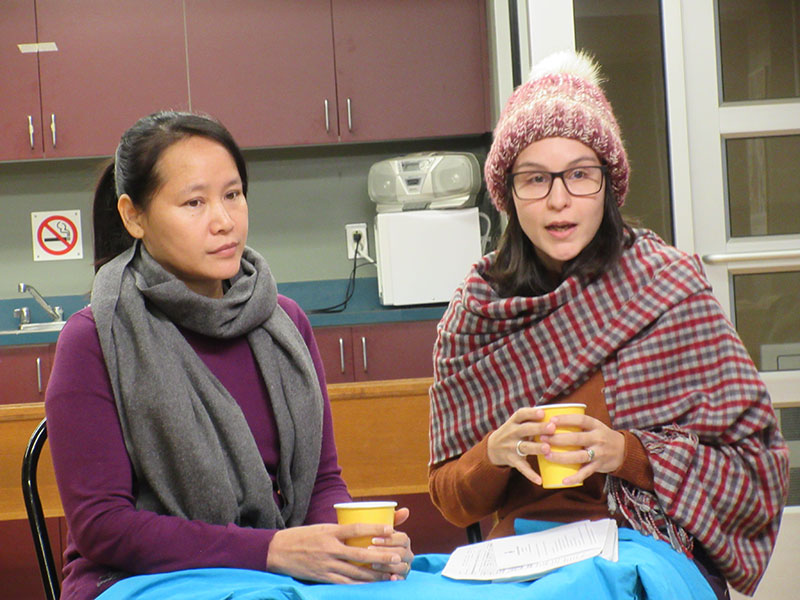
Htwe Nge and Megan Irving sharing their experience with PC members on a wintry January evening.
Htwe Nge’s work gives her deep understanding of the situations of trafficked and working youth. At our meeting, she explained how poverty and uncertain legal status continue to create insecurity for migrant and refugee children as well as limiting their prospects for education and personal development. Migrant work often separates children from their parents or forces them to drop education altogether. Megan inspired us to carry on, emphasizing how our project helps kids learn English but also, importantly, expands their knowledge of the world and gives them a warm intercultural experience with Canadian youth. By widening their horizons, it gives them hope for their futures.
Our visitors’ presence gave the new volunteer team a taste of what lies ahead as they prepare to go to Thailand (for six months!) in June.
Our Project in 2018 – and into the Future
2018 has been a year in which MSEP ‘stayed the course’ in Mae Sot. Our four volunteers showed perseverance and dedication in meeting their obligations to schools in Mae Sot. All spent extra time hanging out with the students at the six schools at which they were assisting. They played soccer, organized debates, fostered learning about human rights, attended weddings and ceremonies, etc. During the year we also saw a benefit from work done in 2017 by one of our volunteers who helped our partner CBO, the Burmese Migrant Education Committee (BMWEC), apply for and obtain a grant from the International Organization for Migration (IOM), resulting in some funding for one of our partners, Pyo Khinn Learning Centre. Completing the complex application for funding was an overwhelming challenge for the BMWEC (and for our volunteer!). The result provided concrete and gratifying evidence of the value of our volunteer’s efforts.
Here in Canada, along with our usual fundraising projects, we held a ‘5 à 7’ at Uplands Cultural and Heritage Centre on October 12th to thank all who have so generously supported us over the years. Fifty people joined us for music, munchies and brief words of thanks. Then later in the fall, anticipating the end of a grant we have received from the Pathy Family Foundation for the last nine years, we decided for the first time to launch a direct appeal to members of our community for support. The response was (and continues to be) extremely encouraging. Donations are up, and we are so grateful!

Delicious food –one of our ways of expressing thanks!
Looking ahead, recruiting young people from our campus who are willing to take the great leap into the fairly demanding but immensely rewarding experience we offer continues to provide challenges. While, ideally, we try to recruit four volunteers, this year we have three. We are confident that they will serve our partners in Mae Sot very effectively. However, we would like to see more students embrace the possibilities the project offers, both for their own growth and for the service they can provide to children in Mae Sot. In addition, as the composition of our project committee evolves, we continue to recruit new members for it as well. If you are interested in getting involved, please contact us! A final note: Recently, we have had a request for a volunteer to help Burmese adults working with one of the Burmese medical organizations with their English. We would be happy to recruit a self-funded, retired teacher for this position. Other similar opportunities occasionally arise. Contact Mary Purkey (marypurkey@gmail.com) if you would like to discuss this possibility.
Our Finances in 2018
2018 marked the third and final year of a grant received from the Pathy Family Foundation in 2016. Thus the pie chart for revenues indicates that this grant provided $15,000 of our revenue last year. Since it has now ended, funds raised by the project’s activities, charitable donations and donations from community organizations have become increasingly important. We are extremely grateful for the response of our community to our fall appeal as reflected in the increase in charitable donations this year. The expenditures chart shows how we used our funds in 2018. $12,500 was given to our six partner schools as MSEP’s annual donation. In addition, a special donation once again enabled us to make a significant targeted contribution to one school. Volunteer support accounted for $17,631 or 30% of our expenses. As you can see, because Project Committee members are all volunteers, we spend little on ourselves! If you have any questions or would like further information about our project finances, please contact us. We are proud of our management and happy to respond.
See the complete details and charts on our Donation page.
Donors and Supporters 2018
We wish to thank everyone who has helped to make our project a success. Donations take many forms. Financial donations, donations of time and energy, raffle prizes, sponsorships, in-kind donations of all sorts have all been deeply appreciated. In addition to those people and organizations noted below are many others who have faithfully supported our fundraisers. Thank you all!
We wish to thank these organizations & businesses:
|
And these individuals:
|
Who we are and what we do
The Mae Sot Education Project (MSEP) is a community project based on the campus of Bishop’s University and Champlain College – Lennoxville in Sherbrooke, Quebec. Since 2004, we have provided assistance to six schools (officially called migrant learning centres or MLCs) for migrant and refugee youth from Burma/Myanmar whose access to education depends on support from the international community. In recent years we have also worked with other MLCs. Each year we select a group of young people from our campus to go to Mae Sot for six months. While there, they provide practical assistance to teachers and enrichment activities for children in the schools. They learn about the situation of displacement experienced by the Burmese people in Thailand as well as about the challenges for the Thai community in coping with a large population of refugees and migrants. Finally, they share their experience with Canadians. Over the last 14 years, MSEP has delivered over $126,000 in funding assistance (excluding two substantial grants given through specific donations) and as of June 2017, will have sent 56 volunteers to assist the migrant education community in Mae Sot.
The Project Committee is made up of members of the community, faculty from Bishop’s and Champlain, and former youth volunteers with the project. Currently, members are: Felix Duplessis Marcotte (2016 volunteer), Judy Keenan, Laurence Michaud (2015 volunteer), Graham Moodie, Mary Purkey, Garry Retzleff, Barbara Rowell (2005 volunteer) and Calila Tardif (2016 volunteer).
Contributions to the project are always welcome and tax receipts are issued. To make a donation electronically, go to our Donate Now page and follow instructions for donating through the Bishop’s University Foundation online or by cheque.
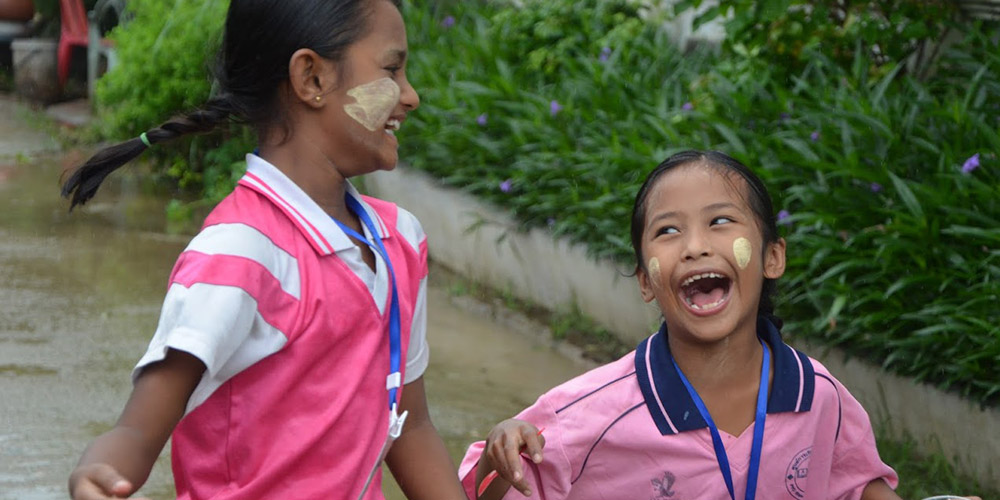
Recent Comments